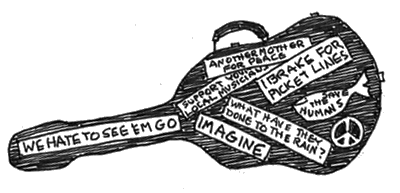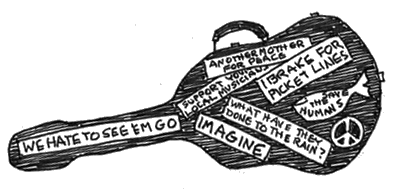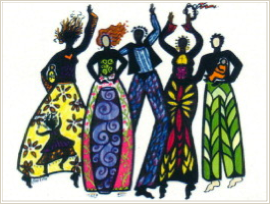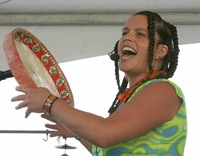



Thursday I ran across this in Malvina’s autobiography-that-kept-turning-into-a-journal:
March 9, 1976
When
the people called me from Pitzer [women’s college in Pomona] for the
seminars of Achievement for Women In Careers, they said, “We have a good
panel of speakers, but we’d like something smashing to close with,
something to make the women move away from this event with a great sense
of achievement, so we want you to come and sing.”
I
said, “You want these women to walk away from this conference with a
feeling of pride in the accomplishments of women, and you’re going to be
paying me $50.00 for a $600.00 gig.” You can be sure Shana Alexander
wasn’t coming for a $50.00 fee, or a $600.00 one either.
The
woman on the phone said, “I’ll see what we can do,” and they came up
with $250.00. They had put out too much on other expenses, they said,
and were caught short for me.
Well, I had made my point, and the money didn’t matter a lot, so I agreed to come.
’Twas ever thus. In the book
I’m reading on the early days of People’s Songs (the late forties)
people complain about the progressive movement of that time not valuing
music or musicians, and I’ve seen it myself as a member of Freedom Song
Network in the San Francisco Bay Area in the last few decades. The civil
rights movement and the anti-apartheid movement in South Africa knew
the power of singing, so maybe I should say “the white progressive movement.”
I
went to a meeting yesterday at the First Congregational Church of
Oakland (hereinafter referred to as First Congo) organized by people who
do understand the power of song. The music didn’t come after endless
speeches but right away, and it was a rousing African song—with
drumming—that raised energy and set the tone for what followed.
What
followed was the founding meeting of the Bay Area manifestation of a
new organization called Genesis, a coming together of churches to take
action on the problems of racism, poverty, and global warming. Folks
from sixteen churches representing six or seven denominations were
present, plus guests from the Alameda Central Labor Council, the
Unitarian seminary, and several community and environmental
organizations. This local group has chosen public transportation as an
issue at the crossroads of racism, poverty and global warming. Bus
services keep getting cut, services for the poor, the disabled, people
of color, and people too young or old to drive, while a disproportionate
amount of money is allocated by the Metropolitan Transportation
Commission to extend Bay Area Rapid Transit to affluent suburbs.
As
we entered the sanctuary we had each been given a piece of ribbon about
a foot long to write our names on. After a rousing sermon by The Rt.
Rev. Steven Charleston, Assistant Bishop of the Episcopal Diocese and
the least Episcopalian-sounding preacher I ever heard, we were asked to
tie our ribbons to those of our neighbors to make a long streamer that
will be taken to an MTC meeting on November 3rd (at 9 a.m. at 1233
Preservation Parkway, corner of 12th and MLK for any East Bay folks
reading this). People promising to attend that meeting to demand funding
for bus service were asked to stand and be counted. We were also asked
to volunteer at get-out-the-vote phone banks. And, of course, to give
money to support all this.
My
partner sings in the choir at First Congo, and kind of twisted my arm
to come because they were afraid they’d get a poor turnout, what with
people being busy with the election. In fact there was a very good
showing and I needn’t have come—but I’m glad I did.
Genesis is a project of the Gamaliel Foundation.
From their website: “The mission of Gamaliel Foundation is to assist
local community leaders to create, maintain and expand independent,
grassroots, and powerful faith-based community organizations so that
ordinary people can impact the political, social, economic, and
environmental decisions that affect their lives; to provide these
organizations with leadership training programs, consultation, research
and analysis on social justice issues; to be a network for mutual
learning environments and working coalitions.”
©2008 by Nancy Schimmel
Monday, October 27, 2008


THE POWER OF SONG









